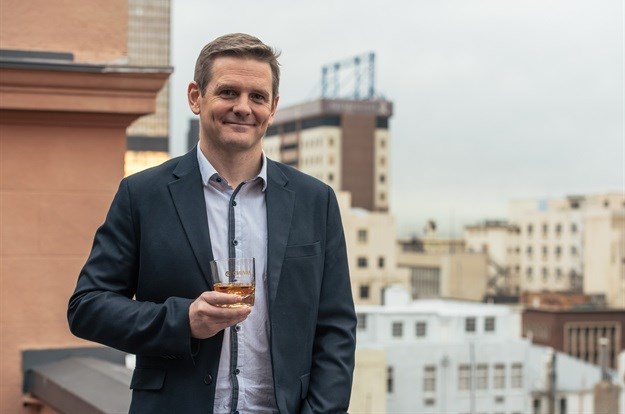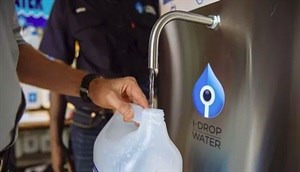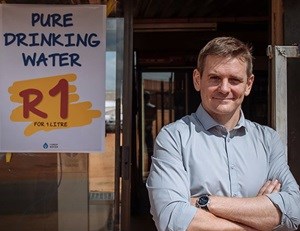
Top stories




ESG & Sustainability#BudgetSpeech2026: SRD grant unchanged, other Sassa social grants see hike
17 hours

More news














ESG & Sustainability
South Africa’s carbon tax should stay: climate scientists explain why












Every week from 8 May to 12 June, $50,000 will be divided amongst the Chivas Venture finalists based on votes from the public, with $250,000 in total at stake. Click here to vote for I-Drop Water.
We caught up with Steere to find out more about the vision behind his social enterprise, the technology behind I-Drop Water, and what his plans are for the funding should the SA startup win.
One of the wonderful things about social entrepreneurship is that there is no trade-off between being profitable and doing something really meaningful and value-additive for the world. I’d love to say that we started I-Drop because we were entirely socially motivated, but the reality is that we started I-Drop because there was a business opportunity in a social challenge. We are able to attract brilliant advisors and team members from both worlds, business and social impact, and this combination is, I believe, where the solutions to big, complex challenges live.
I believe that the reason many social challenges haven’t been addressed is that there’s a perception that they are for governments to solve or beyond the ability of business to tackle; but there are market opportunities everywhere, that new business models and smart technologies can address in a way that’s profitable. Reaching these markets requires creativity and relentless perseverance, but by introducing business efficiencies and sustainable processes into environments where basic social needs aren’t being met can really bring about incredibly positive outcomes.
That said, deciding to focus the business completely on tackling drinking water as a social challenge and defining our values to serve this purpose does introduce complexity and difficulties that a pure profit-focused business may not face. There are probably easier ways of making money in drinking water. However, the personal reward we get in doing something that helps people more than offsets the added challenge of our lean, social-benefit business model.
My wife, Kate, and I founded I-Drop Water together and it wasn’t so much a choice, but instead the recognition of an opportunity at a moment in time where our personal and professional lives allowed us to go all-in on solving drinking water as a challenge. Kate is a business powerhouse with an undergraduate degree from the Wharton School in the USA and an MBA from Oxford University, where we met. I’m the water nerd, ideas and people person. Bringing these two different skillsets together is the reason this good idea is now a growing business.
The sheer size of the social challenge and business opportunity in drinking water was certainly something that appealed to us both. Our ambitions with I-Drop are to completely transform the drinking water industry around the world to get safe, affordable drinking water to the 1.8-billion people who need it. Ultimately, though, it comes down to us taking the (crazy?) step to leave our jobs and start this business and go from there.

I’ve worked in drinking water purification technology and products for many years, prior to which I was in management consulting. For years, as I travelled around Africa, I was always frustrated by the fact that the technology already exists to efficiently and effectively make water safe for drinking, and yet wherever I travelled there were people with relatively low incomes buying huge amounts of bottled water at high prices to try and avoid getting ill. What struck me is that very often, the same small grocery store selling this drinking water had a water supply of some kind from a borehole, tap or water tank. I-Drop was born from the idea of purifying water in the store and thereby stripping out the huge cost of centralised purification, bottling and transport. It’s a similar idea to solar power or mobile phones that have replaced expensive fixed line transmission and communication infrastructure.
The real challenge came from making this simple idea a reality. In places where people need this solution the most, there are typically smaller grocery stores that can’t afford to invest in water purification capital, and so we found a way of putting an I-Drop machine in a grocery store at no cost to the shop owner. We use GSM (sim card) electronics to enable a revenue share model over ongoing sales from our machine. Keeping this real-time monitoring capability over each of our machines, whether they are in Ghana, Zimbabwe, Botswana or South Africa, allows us to retain control over the fleet without the cost of people driving large distances to oversee individual machines.
We are incredibly proud to be representing South African entrepreneurship at the global Chivas Venture competition and are going to do our absolute best to try and bring it home for SA. Winning the competition would be a game-changer for us and enable us to double our current fleet of I-Drop machines here in SA and other African countries, massively increasing our impact.

The notion of “doing business in Africa” is a bit misleading I think. Each country is completely different to operate in and brings with it unique challenges and opportunities.
Zimbabwe, for instance, is a combination of amazing entrepreneurial spirit and some of the most warm and welcoming people I’ve ever had the pleasure of working with, but an economic context that in some ways makes no sense. The shortage of currency is acute, but people find a way of keeping everything turning. SA has a very different dynamic with similarly brilliant and motivated people, but with powerful and established incumbent businesses that can be difficult to break into as a new company with a new idea.
We’re currently only piloting in Accra, Ghana, but from my time there, it’s an absolutely vibrant and energised place. We’re still quite small in Botswana – which runs efficiently and feels much more open and relaxed. I think what all of these countries have in common is diversity, opportunity and entrepreneurial spirit – I honestly can’t imagine working anywhere else in the world.
We’re still small but growing fast. We’re currently in about 60 shops, from large chain-store supermarkets to small tuck-shops in townships. We’ve sold almost half a million litres of drinking water, reduced plastic waste by 1,700 kgs and, compared to other purification technologies, reduced water waste by 1.1-million litres. We’ve also generated hundreds of thousands of rands of economic activity in local economies through water sales in small grocery stores, and at R1 per litre here in SA, we’ve increased the affordability of safe drinking water to a price that just about everyone can afford.
We’re also working on a cross-subsidy model where we’re allocating a small portion of sales revenue to provide free drinking water to a school in Soweto. Our position on this is that even at R1 / litre, some people will still never be able to afford to pay and so we’re covering the cost of providing drinking water to these 700 children and staff with water sales from people who can pay.
We’re pretty certain that this new way of purifying and selling drinking water is going to grow all over the world. It makes sense on so many levels to treat drinking water as a paid-for commodity foodstuff and separate from municipal water provided for sanitation. In most households, drinking water accounts for 5-15% of the total amount of water people use. Most of our water goes down the toilet or is used for washing clothes, dishes, ourselves, etc. With so many people who still lack access to water for sanitation, doesn’t it make more sense to focus government investment on getting decent water to people, and letting companies like us sell super-affordable drinking water in parallel? This way people aren’t flushing the toilet every day with purified drinking water.
Our long-term plans are to found this as a new industry and not just as a business. We want to lead the business effort to get safe, affordable drinking water to everyone, everywhere in a way that doesn’t harm the environment. It’s a bold and slightly crazy ambition, but why not aim high. There are people everywhere who need what we can do and so how could we not do everything we can to reach them.
